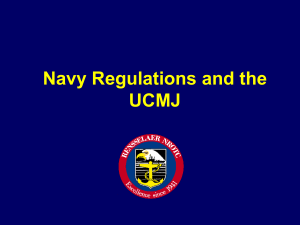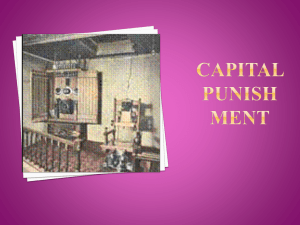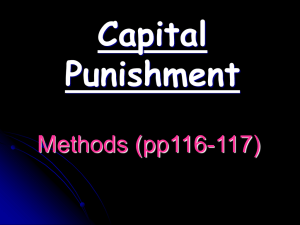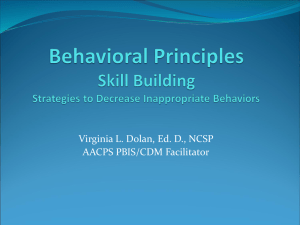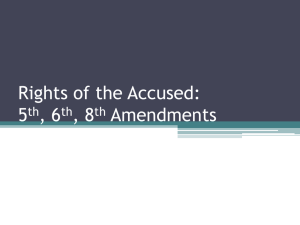Document
advertisement
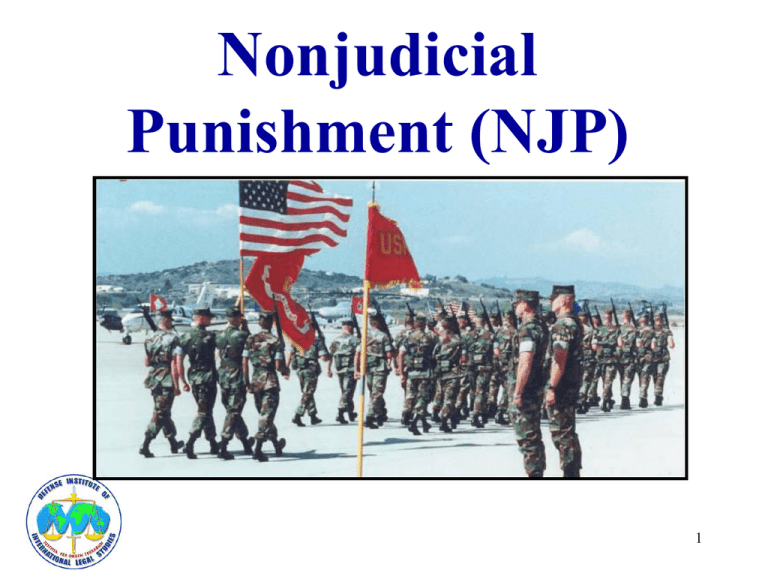
Nonjudicial Punishment (NJP) 1 Purpose of NJP • Commander’s tool for maintaining good order and discipline • Promotes behavior change in servicemembers without courts-martial U.S. Marine Recruiting Poster 2 Purpose is Prompt, Visible Discipline - Not Criminal Conviction • Hearing before CO • Due Process protection complies with modern norms • Procedure is less formal Punishment on board USS Cyane – mid 1800s 3 Who Imposes NJP? • Commanding Officers • Officers-in-Charge U.S. Marine General Officers 4 NJP Authority • No one junior to CO or OIC may impose • Not delegable – CO’s duty to ensure fair treatment of his subordinates 5 Limitations of Superior Commanders • Cannot direct a subordinate commander to impose NJP • Cannot influence which offenses should be disposed of under NJP • Retains authority to take a case to his/her level for disposition General Patton 6 Joint Duty -Members of different services are assigned to same unit -Generally NJP authority is retained by a superior of the same branch -Personnel may be returned to their parent service for NJP NATO Allied Joint Forces Command 7 Offenses Punishable at NJP • Designed for Minor offenses • Generally - Offenses not punishable by: – Confinement for more than one year – Dishonorable Discharge 8 Former Punishment • NJP may be considered former punishment – NJP cannot be imposed for same misconduct more than once • If subsequently court-martialed for same offense, NJP punishment is credited against the court-martial sentence 9 Civilian Action and NJP • Military may punish member for misconduct where: – civilian punishment imposed was exceptionally light – civilian punishment is impracticable for continued military service – where unique military interest exists 10 Notification and NJP • Service member shall be informed in writing of: – – – – charges against him or her the fact that NJP is being considered a summary of the evidence the maximum NJP punishments possible – the right to refuse NJP -The right to speak to a military attorney 11 Refusal of NJP • May leave courts-martial as only alternative • Is not a right to demand trial by courts-martial • Right to refuse expires upon imposition of NJP punishment – Members on ships may not refuse NJP 12 Rights at Hearing • To be present and personally present case to the CO • To remain silent, anything said at NJP may be used later at courts-martial • A personal representative, though not necessarily a lawyer 13 Rights at Hearing • To be informed of and allowed to examine all evidence to be considered • To be allowed to speak and present witnesses 14 Civilian Witnesses • Must be reasonably available • CO has no power to require civilian’s attendance Civilian Witness providing testimony 15 Administrative Matters • NJP Guide – used by CO’s when conducting NJP • Military Rules of Evidence – do not apply at NJP • Standard of Proof – Depends on the service • U.S. Army – “beyond reasonable doubt” • U.S. Navy – “preponderance of the evidence” 16 Publication of NJP Results • Posting of results in common area of unit • If for military personnel only, may be published fully • If civilians have access to information, names must be removed • NJP is a military offense, not for public record 17 CO Options at Hearing • CO chooses and announces punishment at the hearing • Impose NJP • Refer charges to courtsmartial • Postpone imposition of punishment Commanding Officer announces NJP punishment 18 Punishments • • • • • • Admonition Reprimand Reduction in rate and pay Forfeiture of pay Loss of liberty Extra Military Instruction (EMI) • NO Prison Confinement 19 Basis for Maximum Punishments • Grade of imposing officer • Rank of service member (officer or enlisted) • Whether it is a ship or shore command – bread & water may not be imposed on shore 20 Clemency and Corrective Action • A member’s commander or reviewing superior commander may: – SET ASIDE NJP • removes finding from member’s record • exercised when there is clear injustice • must take place within reasonable time frame – ORDER UNEXECUTED PORTIONS OF PUNISHMENT TO BE CANCELLED 21 • A member’s commander or reviewing superior commander may also : – Reduce punishment – Suspend all or part of the punishment • These actions must generally happen within four months of imposition 22 Appeals • All members have right to appeal NJP to immediate superior of the imposing officer • Two grounds for appeal – punishment is unjust – punishment is disproportionate to offense 23 • Service members must make timely appeal – must be submitted within five days of imposition of NJP – extension for good cause may be requested 24 Procedure for Appeal • Submitted in writing by service member • To the CO’s superior by way of the CO • CO shall endorse the appeal and include – statement of facts – copies of documents and witness statements – copy of service member’s record of performance 25 Action of Appellate Authority • “Abuse of Discretion” standard of review • Can reduce, but not increase, punishment • May take corrective action or order a rehearing • At rehearing, maximum punishment limited to original NJP punishment 26 27
